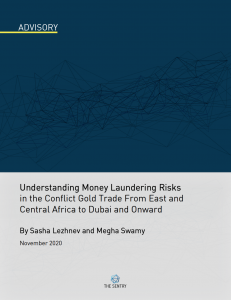 Download the full advisory.
Download the full advisory.
 Download the one-page summary.
Download the one-page summary.
For more on this topic, explore our February 2021 briefing.
This advisory highlights the money laundering risks stemming from the flow of conflict gold from four sub-Saharan African countries affected by armed conflict and corruption—the Democratic Republic of Congo (DRC), South Sudan, Sudan, and Central African Republic (CAR)—with a focus on risks in Dubai, United Arab Emirates (UAE), the destination point for an estimated 95% of gold from East and Central Africa.* Because gold is easily smuggled in high volumes, it is frequently used as a money laundering vehicle by armed groups, criminal networks, and corrupt actors, who can then mask its origins by melting it together with other gold.*
The record-breaking rise in world gold prices in recent years has driven a new artisanal gold mining and refining rush in conflict-affected and high-risk areas in East and Central Africa.*,*, *, * Annually, over $3 billion in gold mined in the affected regions, including conflict gold from which armed groups and army units profit, reaches international markets in the United States, Europe, Asia, and the Middle East,* according to investigations by The Sentry and other organizations.*
Take action:
Urge the US, EU, and United Nations Security Council to Sanction Gold Smuggling Companies and Networks.
Nearly all of this gold is first imported to Dubai, UAE, which has rapidly risen over the past 20 years to become one of the world’s largest gold trading centers, particularly for artisanal and small-scale gold from sub-Saharan Africa, Latin America, and South Asia.* Artisanally mined gold from the DRC, South Sudan, and CAR is mainly smuggled or exported to one of six neighboring countries—Uganda, Rwanda, Cameroon, Kenya, Chad, or Burundi—before being exported to Dubai. Sudan mainly exports directly to the UAE.*, *
The Financial Action Task Force (FATF),* the Organisation for Economic Co-operation and Development (OECD), * and gold industry associations such as the London Bullion Market Association (LBMA) have highlighted the financial crime and supply chain risks associated with the trade in gold from conflict and high-risk areas, * as have media and civil society reports. Yet a number of policy and regulatory loopholes and shortcomings in the UAE’s anti-money laundering and countering the financing of terrorism (AML/CFT) regime have allowed for the trade in conflict and high-risk gold to flourish. Understanding the conflict gold trade and its associated predicate offenses and financial crime risks, particularly in the UAE, will help financial institutions; policymakers; law enforcement agencies; refiners; and electronics, jewelry, and other companies to more effectively address risks and disrupt the illicit flows fueling violence and corruption in East and Central Africa. Meanwhile, there is a small but growing conflict-free gold sector that benefits artisanal mining communities in the region and requires significantly increased support, both in policy changes and funding, to help formalize and incentivize responsible, conflict-free artisanal mining.*
Summary of recommendations
- The UAE government should close the regulatory loopholes that allow for trade in conflict and high-risk gold. The US government, the European Union (EU), and gold industry actors such as the LBMA should engage the UAE’s authorities to require proof of payment for gold being imported into the country, require all gold refiners with a presence in the UAE to undergo independent, third-party audits, and ban cash transactions for gold above small amounts.
- The UAE government should address priority issues from the latest FATF evaluation relevant to the conflict gold trade.* These include increasing the collection and use of financial intelligence; better educating designated non-financial businesses and professions (DNFPBs) on suspicious transaction monitoring and reporting obligations; implementing better mechanisms to allow for investigating cases of suspected money laundering; and enhancing understanding of “immediate and pressing” threats, * such as the foreign proceeds of crime.
- Gold refiners and electronics, jewelry, and automotive companies should conduct enhanced due diligence on their suppliers and refer to the red flags in the FATF gold typology report, as well as those listed in this advisory, to assess risks when purchasing gold from the UAE.*
- Financial institutions should carry out enhanced due diligence on customers who deal in gold, including miners, refiners, jewelry shops, and gold traders. This should include enhanced transaction monitoring in line with a risk-based approach, particularly around related-party transactions and for payments to or from countries listed in this advisory as source, transshipment, or destination.

